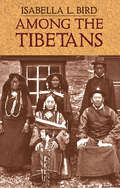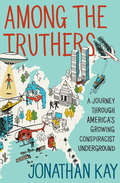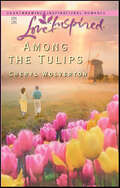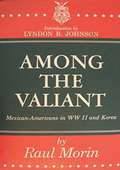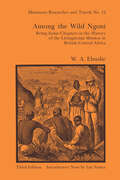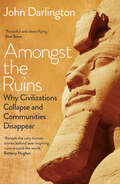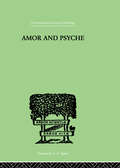- Table View
- List View
Among the Thugs
by Bill BufordThey have names like Barmy Bernie, Daft Donald, and Steamin' Sammy. They like lager (in huge quantities), the Queen, football clubs (especially Manchester United), and themselves. Their dislike encompasses the rest of the known universe, and England's soccer thugs express it in ways that range from mere vandalism to riots that terrorize entire cities. <P><P>Now Bill Buford, editor of the prestigious journal Granta, enters this alternate society and records both its savageries and its sinister allure with the social imagination of a George Orwell and the raw personal engagement of a Hunter Thompson.
Among the Tibetans
by Isabella L. BirdAmong the Tibetans is a record of Isabella Bishop's 1889 journey into Ladakh. It is a fascinating account of her encounters with the region's natives and her observations of their lifestyles, as well as an insight into the difficulties of travelling in such areas in the late nineteenth century.
Among the Tibetans
by Isabella L. BirdBird (1831-1904) recounts her rugged passage through the Himalayas by horseback and her four-month sojourn amid "the pleasantest of people." Bird's evocative accounts of Tibetan ceremonies, decorations, costumes, and music, along with her vivid descriptions of palaces, temples, and monasteries, offer rare glimpses of a vanished world. 21 black-and-white illustrations.
Among the Truthers: A Journey Through America's Growing Conspiracist Underground
by Jonathan KayFrom 9/11 conspiracy theorists and UFO obsessives tothe cult of Ayn Rand and Birthercrusaders, America is suffering from an explosion in post-rationalistideological movements. In Among the Truthers,journalist Jonathan Kay offers a thoughtful and sobering look at how socialnetworking and Web-based video sharing have engendered a flourishing of new conspiracism. Kay details the sociological profiles of tenbrands of modern conspiracists—the Failed Historian,the Mid-Life Crack-Up, the Damaged Survivor, the Campus Revolutionary, theStoner, the Clinical Case, the Puzzle Solver, the Christian Doomsayer, the CosmicVoyager, and the Egomaniac—in a compelling exploration of America’s departurefrom reason and what it means for the very future of rational discourse as thenation steps further into the 21st century.
Among the Tulips
by Cheryl WolvertonTurning forty is a major milestone for Annie Hooper, who has been married, with stepchildren, since she was seventeen. The birthday gift of a trip to Holland offers some unexpected and exciting changes to her routine. And when a car accident in Amsterdam leads to her rescue by a handsome celebrity, she begins to wonder whether God has a new direction for her.Victor Richardson offers his château to Annie so she can recover and resume her vacation—with him as guide. And while Annie’s leg mends, she discovers that her Prince Charming requires God’s grace, and her help as well, to make a fresh start of his own.
Among the Valiant: Mexican-Americans in WWII and Korea
by Raul MorinFirst published in 1963, this book by Raul Morin, who served in the 79th Infantry Division of the U.S. Army, was the first book to chronicle in detail the heroics of the Mexican-American soldier during World War II and Korea. It also provides information about the Chicano Medal of Honor recipients during these wars.The book is a tribute to all American fighting men, "be they white, red, black, yellow, or brown. We feel just as proud of the Colin Kellys, the Dobbie Millers, and the Sadio Munemoris as we are of the Martinez', Garcias and Rodriguez'."
Among the Walking Wounded: Soldiers, Survival, and PTSD
by Colonel John Conrad<p>A gripping account of PTSD, and a stark reminder that, for many, wars go on long after the last shot is fired. <p>In the shadows of army life is a world where friends become monsters, where kindness twists into assault, and where self-loathing and despair become constant companions. Whether you know it by old names like “soldier’s heart,” “shell shock,” or “combat fatigue,” post-traumatic stress disorder has left deep and silent wounds throughout history in the ranks of fighting forces. <p><i>Among the Walking Wounded</i> tells one veteran’s experience of PTSD through an intimate personal account, as visceral as it is blunt. In a courageous story of descent and triumph, it tackles the stigma of PTSD head-on and brings an enduring message of struggle and hope for wounded Canadian veterans. This book is a must-read for anyone who cares about Canadian veterans and the dark war they face long after their combat service is ended.</p>
Among the White Moon Faces: An Asian-American Memoir of Homelands
by Shirley G. LimPoet Lim's memoir describes her childhood in Malaysia, the post- colonial days of her university youth, and her eventual migration to the United States. In this cultural document of both the US and Malaysia, her poetic mastery makes the tale vivid by its evocative language and attention to emotional detail, somewhat mitigating the often characteristic triteness of immigrant stories, particularly ones like this that rely heavily on feminist and psychological ideologies.
Among the White Moon Faces: An Asian-American Memoir of Homelands (The\cross-cultural Memoir Ser.)
by Shirley Geok-lin LimThis &“fascinating autobiography&” from an award-winning Asian-American female author &“reads like a novel&” (The Washington Post Book World). With insight, candor, and grace, Shirley Geok-lin Lim recalls her path from her poverty-stricken childhood in war-torn Malaysia to her new and exciting yet uncertain womanhood in America. Grappling to secure a place for herself in the United States, she is often caught between the stifling traditions of the old world and the harsh challenges of the new. But throughout her journey, she is sustained by her &“warrior&” spirit, gradually overcoming her sense of alienation to find a new identity as an Asian American woman: professor, wife, mother, and, above all, an impassioned writer. In Among the White Moon Faces, Lim offers a memorable rendering of immigrant women&’s experience and a reflection upon the homelands we leave behind, the homelands we discover, and the homelands we hold within ourselves. &“What sets Among the White Moon Faces apart is that Lim writes with such aching precision, revealing and insightfully analyzing her changing roles as woman, immigrant, scholar, and Other.&” —San Francisco Chronicle Book Review &“Lim&’s descriptions are both lyrical and precise.&” —Publishers Weekly &“Evocative writing bolstered by insights into colonialism, race relations, and the concept of the &‘other&’. . . . This is an entrancing memoir.&” —Kirkus Reviews
Among the Wild Ngoni: Being Some Chapters In The History Of The Livingstonia Mission In British Central Africa (classic Reprint)
by W.A.L. ElmslieIn 1875 the Livingstonia Mission landed on the west shore of Lake Nyasa. The first advance of the missionaries into Ngoniland was in 1878, and this 1899 work describes the enforced setting up of the mission among the Ngoni people, warriors of the Zulu race.
Among the Wonderful: A Novel
by Stacy CarlsonIn 1842 Phineas T. Barnum is a young man, freshly arrived in New York and still unknown to the world. With uncanny confidence and impeccable timing, he transforms a dusty natural history museum into a great ark for public imagination. Barnum's museum, with its human wonders and extraordinary live animal menagerie, rises to become not only the nation's most popular attraction, but also a catalyst that ushers America out of a culture of glassed-in exhibits and into the modern age of entertainment.In this kaleidoscopic setting, the stories of two compelling characters are brought to life. Emile Guillaudeu is the museum's grumpy taxidermist, who is horrified by the chaotic change Barnum brings to his beloved institution. Ana Swift is a professional giantess plagued by chronic pain and jaded by a world of gawkers. The differences between these two are many: one is isolated and spends his working hours making dead things look alive, while the other has people pushing against her, and reacting to her, every day. But they both move toward change, one against his will, propelled by a paradigm shift happening whether he likes it or not, and the other because she is struggling to survive. In many shapes and forms, metamorphosis is at the core of Among the Wonderful. Pursuing this theme, the book weaves a world where upper Manhattan is still untrammeled wilderness, the Five Points is at the height of its bloody glory, and within the walls of Barnum's museum, ancient tribal feuds play out in the midst of an unlikely community of marvels.From the Hardcover edition.
Among the Woo People: A Survival Guide for Living in a College Town (Keystone Books)
by Russell FrankIn the mid-nineties, Russell Frank left a peaceful life in rural California to raise three kids in a town saturated with fraternities, late-night undergrad fast food haunts, and rowdy football crowds. Among the Woo People recounts his two decades living—and surviving—in State College, Pennsylvania, the often-chaotic home of Penn State University.This humorous peek at life in a college town smack-dab in the middle of rural Pennsylvania chronicles a changing community over the course of two eventful decades. A professor of journalism, former columnist for the Centre Daily Times, and contributor to StateCollege.com, Frank has a unique perspective on living in the shadow of a university—especially on the tribe of nomadic young adults known as the “Woo people,” so named for their signature mode of celebratory communication. He invites readers into the routines of his hectic household as they embrace their new home, skewers the culture of intercollegiate sports, relates the challenges and peculiarities of teaching at one of the nation’s largest universities, and, most important, teaches us to be amused at college-kid antics and to appreciate their academic and real-world accomplishments, even as we anxiously tick off the days until semester’s end.From tales of missing porch furniture and red plastic cups in the bushes to a “Nude Year’s Eve” run by an octet of forty-somethings to the sweet relief of summer, Frank’s hilarious, insightful essays are indispensable for anyone who wants to survive, appreciate, and enjoy college-town life.
Amongst Our Weapons (Rivers of London #9)
by Ben AaronovitchThe ninth novel of the bestselling Rivers of London urban fantasy series returns to the adventures of Peter Grant, detective and apprentice wizard, as he solves magical crimes in the city of London.There is a world hidden underneath this great city. The London Silver Vaults—for well over a century, the largest collection of silver for sale in the world. It has more locks than the Bank of England and more cameras than a paparazzi convention. Not somewhere you can murder someone and vanish without a trace—only that&’s what happened. The disappearing act, the reports of a blinding flash of light, and memory loss amongst the witnesses all make this a case for Detective Constable Peter Grant and the Special Assessment Unit. Alongside their boss DCI Thomas Nightingale, the SAU find themselves embroiled in a mystery that encompasses London&’s tangled history, foreign lands and, most terrifying of all, the North! And Peter must solve this case soon, because back home his partner Beverley is expecting twins any day now. But what he doesn&’t know is that he&’s about to encounter something—and somebody—that nobody ever expects… Effortlessly original, endlessly inventive and hugely entertaining—step into the world of the much-loved, bestselling Rivers of London series.
Amongst Our Weapons: The Brand New Rivers Of London Novel
by Ben AaronovitchTHE BRAND NEW NOVEL IN THE #1 BESTSELLING RIVERS OF LONDONThere is a world hidden underneath this great city...The London Silver Vaults - for well over a century, the largest collection of silver for sale in the world. It has more locks than the Bank of England and more cameras than a celebrity punch-up. Not somewhere you can murder someone and vanish without a trace - only that's what happened.The disappearing act, the reports of a blinding flash of light and memory loss amongst the witnesses all make this a case for Detective Constable Peter Grant and the Special Assessment Unit.Alongside their boss DCI Thomas Nightingale, the SAU find themselves embroiled in a mystery that encompasses London's tangled history, foreign lands and, most terrifying of all, the North!And Peter must solve this case soon because back home his partner Beverley is expecting twins any day now. But what he doesn't know is that he's about to encounter something - and somebody - that nobody ever expects...Effortlessly original, endlessly inventive and hugely entertaining - step into the world of the much-loved, Number One bestselling Rivers of London series.* * * * *PRAISE FOR BEN AARONOVITCH & THE RIVERS OF LONDON SERIES:'Highly entertaining'SUNDAY EXPRESS'Charming, witty, exciting'THE INDEPENDENT'Ben Aaronovitch has created a wonderful world full of mystery, magic and fantastic characters. I love being there more than the real London'NICK FROST'As brilliant and funny as ever ... Masterfully crafted - gives the late, great Terry Pratchett a run for his money'THE SUN'An incredibly fast-moving magical joyride for grown-ups'THE TIMES'Funny and wildly inventive'MAIL ON SUNDAYDiscover why this incredible series has sold over two million copies worldwide. If you're a fan of Terry Pratchett, you will love the imaginative, irreverent and all-round irresistible RIVERS OF LONDON books.
Amongst Our Weapons: The Brand New Rivers Of London Novel
by Ben AaronovitchTHE BRAND NEW NOVEL IN THE #1 BESTSELLING RIVERS OF LONDON SERIESThere is a world hidden underneath this great city...The London Silver Vaults - for well over a century, the largest collection of silver for sale in the world. It has more locks than the Bank of England and more cameras than a celebrity punch-up. Not somewhere you can murder someone and vanish without a trace - only that's what happened.The disappearing act, the reports of a blinding flash of light and memory loss amongst the witnesses all make this a case for Detective Constable Peter Grant and the Special Assessment Unit.Alongside their boss DCI Thomas Nightingale, the SAU find themselves embroiled in a mystery that encompasses London's tangled history, foreign lands and, most terrifying of all, the North!And Peter must solve this case soon because back home his partner Beverley is expecting twins any day now. But what he doesn't know is that he's about to encounter something - and somebody - that nobody ever expects...Effortlessly original, endlessly inventive and hugely entertaining - step into the world of the much-loved, Number One bestselling Rivers of London series.* * * * *PRAISE FOR BEN AARONOVITCH & THE RIVERS OF LONDON SERIES:'Highly entertaining'SUNDAY EXPRESS'Charming, witty, exciting'THE INDEPENDENT'Ben Aaronovitch has created a wonderful world full of mystery, magic and fantastic characters. I love being there more than the real London'NICK FROST'As brilliant and funny as ever ... Masterfully crafted - gives the late, great Terry Pratchett a run for his money'THE SUN'An incredibly fast-moving magical joyride for grown-ups'THE TIMES'Funny and wildly inventive'MAIL ON SUNDAYDiscover why this incredible series has sold over two million copies worldwide. If you're a fan of Terry Pratchett, you will love the imaginative, irreverent and all-round irresistible RIVERS OF LONDON books.
Amongst Ourselves: A Self-Help Guide to Living With Dissociative Identity Disorder
by Tracy Alderman Karen MarshallWhat is DID? How can you cope with having it? How do you find a good therapist you can trust? What are good things about having DID? Tracy Alderman, Ph.D. and Karen Marshall, L.C.S.W. answer all of these questions and more. DID is not a life sentence, it can be fun! You are a survivor. Open up this book and find out why!
Amongst the Marines: The Untold Story
by Steven PreeceSteven Preece was a Royal Marine Commando from 1983 to 1990, serving first at entry-level and then as a lance-corporal. Amongst the Marines is Steven's first-hand account of his years as an elite soldier, focusing directly on the excessive and often shocking lifestyle of the Marines during this time, and impact this had on his own personality and behaviour.Preece fulfilled his childhood ambition by earning the coveted Green Beret when he was 18. He was unaware, however, of the brutal rite of passage that awaited him and all the other 'pieces of skin' [new recruits]. Violence in the Marines, as Steven discovered, was not limited to the battlefield but a continual part of a pervasive culture of bullying and aggression. It did not take long for Preece to be accepted into this culture and to adopt it as his own. On duty he was fit, committed and loyal, while off duty he displayed a mammoth capacity for drinking, fighting and womanising. On home leave, Steven found it increasingly hard to adapt to civilian life. His drinking sessions in local pubs frequently ended in fights with the locals and even in violence against members of his own family. Preece earned a reputation amongst his fellow Marines for pranks and dangerous behaviour; and this eventually led him to be court-maritialled. To his relief and surprise, however, Preece was fully acquitted by the court.Amongst the Marines is an unflinching exposé of the culture of the Marines, from foul practical jokes and rough justice to the off-duty orgies of drink, sex and violence. It is a no-holds-barred account of the many shocking incidents Preece witnessed and participated in, from his first day as a new recruit to his exit from the Marines with his reputation intact and his scores settled once and for all.
Amongst the Ruins: Why Civilizations Collapse and Communities Disappear
by John DarlingtonAmongst the Ruins explores the loss of ancient civilizations, the collapse of ruling elites, and the disappearance of more recent communities and their local traditions. Some of these are now sealed under 3,000-year-old peat, others lost to rising seas or sands, and the carcasses of twentieth-century buildings which serve as reminders of the destructive power of war. These compelling stories of fallen or lost places are brought together through themes of war, climate change, natural hazards, human self-destruction, and simple economics. From the ice of the Arctic fringe, through to the desert landscapes of North Africa, by way of South America&’s high mountains and Southeast Asia&’s urban sprawl, Amongst the Ruins charts the rise and fall of places and communities around the world, the fascinating characters associated with them, and the important events that punctuate their history. Exploring wide-ranging examples from prehistory to the present day, John Darlington challenges us to recognize past failures and identify what we need to do to protect the cultures of our current world.
Amor And Psyche: THE PSYCHIC DEVELOPMENT OF THE FEMININE (Works By Erich Neumann Ser. #6)
by Neumann, ErichFirst Published in 1999. Routledge is an imprint of Taylor & Francis, an informa company.
Amor Belli: Love and Strife in Lucan's Bellum Civile
by Giulio CelottoCompelled by the emperor Nero to commit suicide at age 25 after writing uncomplimentary poems, Latin poet Lucan nevertheless left behind a significant body of work, including the Bellum Civile (Civil War). Sometimes also called the Pharsalia, this epic describes the war between Julius Caesar and Pompey.Author Giulio Celotto provides an interpretation of this civil war based on the examination of an aspect completely neglected by previous scholarship: Lucan’s literary adaptation of the cosmological dialectic of Love and Strife. According to a reading that has found favor over the last three decades, the poem is an unconventional epic that does not conform to Aristotelian norms: Lucan composes a poem characterized by fragmentation and disorder, lacking a conventional teleology, and whose narrative flow is constantly delayed. Celotto’s study challenges this interpretation by illustrating how Lucan invokes imagery of cosmic dissolution, but without altogether obliterating epic norms. The poem transforms them from within, condemning the establishment of the Principate and the Julio-Claudian dynasty.
Amor Cruel
by Colleen HooverDepois de se conhecer o lado cruel do amor, será possível viver um amor verdadeiro? Tate é enfermeira e muda-se para São Francisco, para casa do irmão, Corbin, para estudar e trabalhar. Miles é piloto-aviador e mora no mesmo prédio de Corbin. Depois de se conhecerem de forma atribulada, Tate e Miles acabam por se aproximar e dar início a uma relação exclusivamente física. Para que esta relação exista, Miles impõe a Tate duas regras: «Não faças perguntas sobre o meu passado. Não esperes um futuro.» Tate aceita o desafio de manter uma relação distante, sem nenhum compromisso, nem sequer o da amizade. A relação alimenta-se assim da atração mútua entre os dois. Miles nunca fala de si nem do seu passado, e comporta-se perante Tate de acordo com as regras que ele definiu. Será Miles capaz de desvendar o que se esconde por detrás desta necessidade tão grande de se distanciar emocionalmente dos outros? E poderá algo tão cruel transformar-se numa relação bonita e duradoura?
Amor and Psyche: The Psychic Development of the Feminine: A Commentary on the Tale by Apuleius. (Mythos Series) (Bollingen Series #687)
by Erich NeumannThe renowned tale of Amor and Psyche, from Apuleius's second-century Latin novel The Golden Ass, is one of the most charming fragments of classical literature. Neumann chose it as the exemplar of an unusual study of feminine psychology. Unfolding the spiritual and mythical background of the pagan narrative, he shows how the contest between the mortal maid Psyche and the great goddess Aphrodite over the god Amor--Aphrodite's son, Psyche's husband--yields surprising and valuable insights into the psychic life of women.
Amor and Psycho: Stories (Vintage Contemporaries)
by Carolyn CookeFrom the author of Daughters of the Revolution and The Bostons (winner of the PEN/Robert W. Bingham Prize for fiction) come eleven stories about sex and death, violence and desire, love and madness, set in a vast American landscape that ranges from the largest private residence in Manhattan to the lush rain forests and marijuana farms of Northern California. In "Francis Bacon," an aspiring writer learns essential lessons from an aging pornographer. In "The Snake," a restless Jungian analyst sheds one existence after another. In "The Boundary," a muralist falls in love with a troubled boy from the rez. In the surreal "She Bites," a man builds an architecturally distinguished doghouse as his wife slowly transforms. And in the transcendent, three-part title story, two best friends face their strange fates, linked by a determination to wrest meaning and coherence from lives spiraling out of control. At once philosophical and compulsively readable, Amor and Psycho dives into our darkest spaces, confronting the absurdity, poetry and brutality of human existence. This ebook edition includes a Reading Group Guide.
Amor and Summer Secrets (Amor And Summer Secrets Ser. #1)
by Diana Rodriguez WallachAll She Never Wanted. . . For fifteen-year-old Mariana Ruiz, it's not so much an unexpected vacation as a literal guilt trip--her father's way of atoning for ignoring his Puerto Rican roots. But freedom from her parents is little compensation for being forced to spend two months with complete strangers rather than with her best friends in Philadelphia. Once on vacation, her worst fears come true. The heat is merciless, the food is spicy, and her great aunt and uncle's mountain house teems with relatives, only one of whom--her distant cousin Lilly--speaks English. Bored, and hoping to make up for missing her best friend's star-studded Sweet 16, Mariana offers to help in the planning of Lilly's Quinceañera. Soon, despite herself, Mariana clicks with new friends who open doors to romance and long-hidden secrets. Suddenly the summer she dreaded is ending way too quickly. It might turn out that the last place she ever wanted to go is the one place she truly finds herself. Funny, touching, and smart, Untitled is a story about friendship, family, rivalry, secrets, and how much you can change over the course of one loco summer. . .
Amor belli: Love and Strife in Lucan’s Bellum civile
by Giulio CelottoCompelled by the emperor Nero to commit suicide at age 25 after writing uncomplimentary poems, Latin poet Lucan nevertheless left behind a significant body of work, including the Bellum Civile (Civil War). Sometimes also called the Pharsalia, this epic describes the war between Julius Caesar and Pompey.Author Giulio Celotto provides an interpretation of this civil war based on the examination of an aspect completely neglected by previous scholarship: Lucan’s literary adaptation of the cosmological dialectic of Love and Strife. According to a reading that has found favor over the last three decades, the poem is an unconventional epic that does not conform to Aristotelian norms: Lucan composes a poem characterized by fragmentation and disorder, lacking a conventional teleology, and whose narrative flow is constantly delayed. Celotto’s study challenges this interpretation by illustrating how Lucan invokes imagery of cosmic dissolution, but without altogether obliterating epic norms. The poem transforms them from within, condemning the establishment of the Principate and the Julio-Claudian dynasty.


